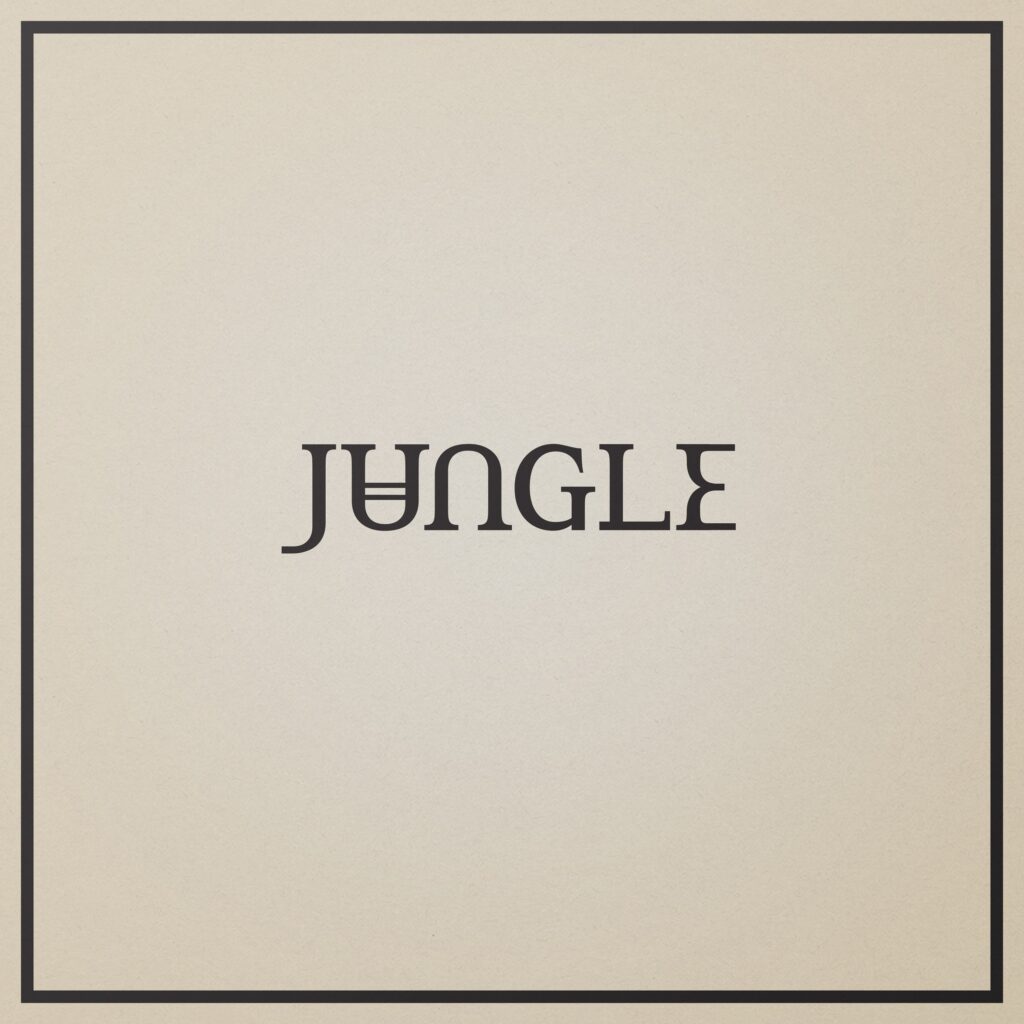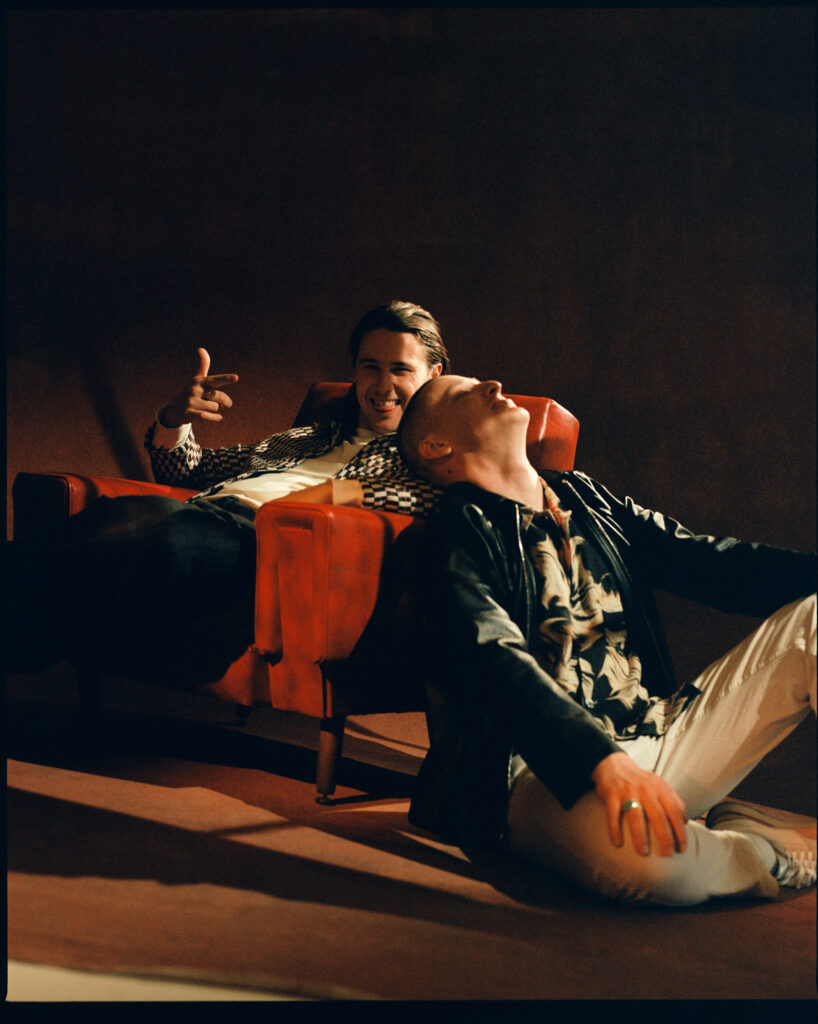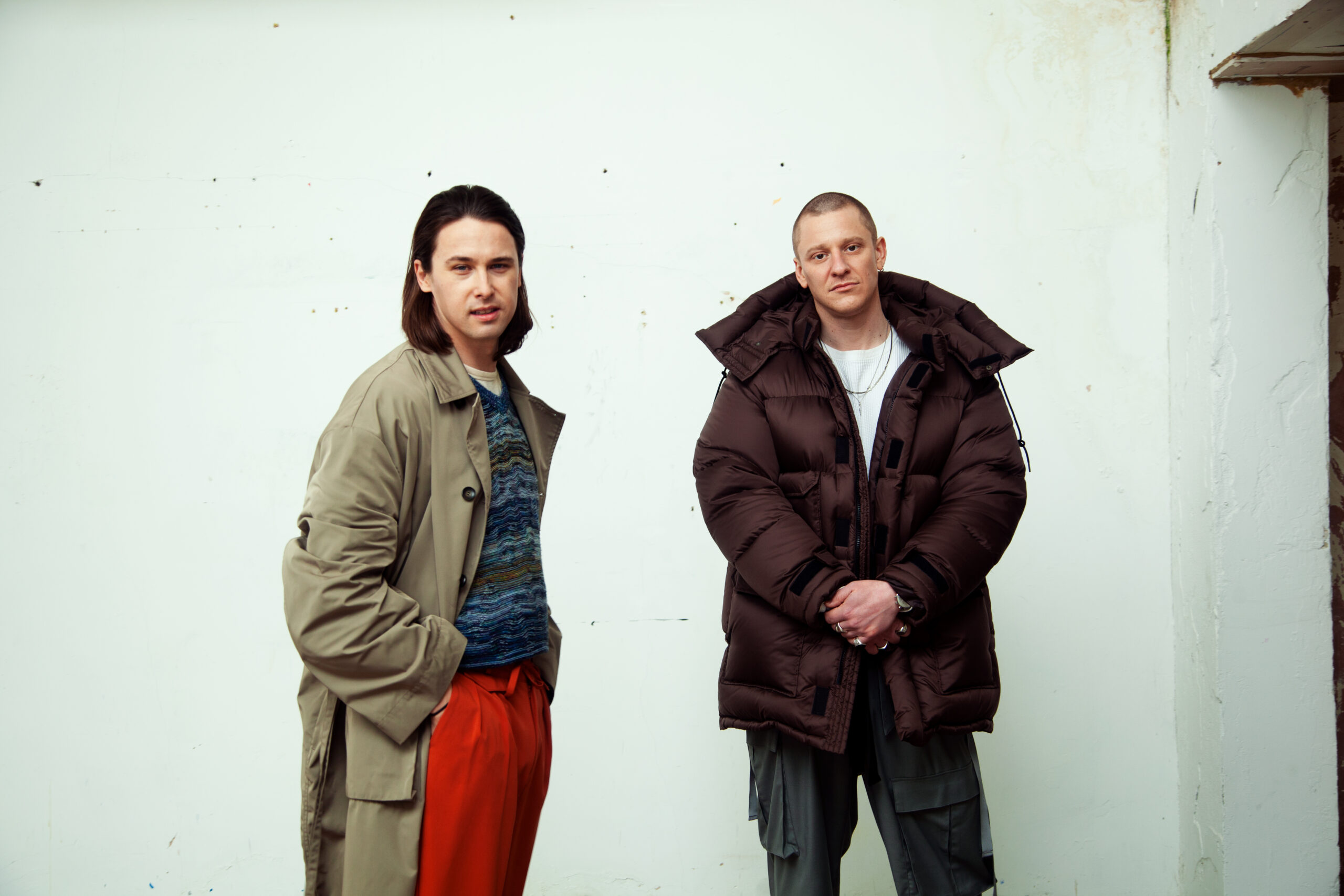 Foto-© Anna Victoria Best
Foto-© Anna Victoria Best
Wie ist es eine Band zum Gespräch zu treffen, die untypisch im Vergleich mit anderen Bands eher unnahbar wirkt. Ist sie danach nahbarer? Die Frage wird sich am Ende klären, doch vorher musste Josh von Jungle ein paar Fragen beantworten. Fragen, rund um ihr neues Album Loving In Stereo. Das dritte Werk von Jungle, das erste Album auf ihrem eigenen Label. Ach und wie die Gretchenfrage „Bongos oder Drums“ beantwortet wurde, erfahrt ihr auch hier!
I have to start this interview with a short story, because this is sort of a birthday present. Keep Moving was released this March, around my birthday and on that day I got the interview request. Last year Dua Lipa released Future Nostalgia on my birthday and we all now what happened with this album. I would say, releasing in this particular week is a very good omen for your upcoming album.
J: That’s good to hear. I hope so.
Are you excited?
J: Very much. Of course. I think it’s our best album so far and we’re super excited for people to hear it. The songs, which have been out so far got a great response and let’s see where the wind takes us.
During the past years, I realised you have a very significant CI. The way your artworks look like and your music videos, too. How do you manage to develop your CI further without losing sight of it?
J: What’s a CI?
Well, it’s a marketing term. Short form for Corporate Identity.
J: (laughs) Everything is corporate these days… Well, I mean it’s just taste, isn’t it? It shows what we like and ultimately it’s a reflection of all the things we drawn to. I think a lot of this record is about expressing ourselves and following our instincts.
Especially in your videos. Would you say the dancing is your theme or your language? Is this the way you want to present your music?
J: Of course, it’s the video. That’s what it is. We want people to enjoy that. For us, dancing is the most kind of simplest form of expression to music. We had a great time making these videos. We got 14 music videos done for the album, which is a first for us. We wanted to be kind of a series. A Netflix series. Each track is an episode and we have this amazing cast and there are so expressive. For us, we want to make stuff which is inspiring to other people. I’ve always been inspired by musicals, like Westside Story, Grease and even Oliver Twist, when I was very young. The Michael Jackson video for Smooth Criminal, I used to watch, always inspired me massively, because I felt at some point I can dance like that. When we watch those videos, there’s an effortlessness to the way these people express themselves. It’s so addictive. If it doesn’t inspire you or want you to start with, even us, then it’s not good. We love to watch the videos and even when making the music, I’m inspired to do something. We make stuff, we like and that’s really important.

Definitely and you can see this in your videos. I wouldn’t say it is „just“ dancing. It has a lot of emotions and doesn’t need a story, like typical music videos. They have a story and a concept it and I miss the emotion in those videos. In your videos you can see people reacting to your music and that causes something in the people who are watching it.
J: A 100%. Different songs and different videos have different emotional levels. For us it’s just about capturing those moments. Like a chemical reaction on camera. Same in the studio. We tried to take these moments that feel reactionary and capture those. Everything which is overthought tends to lose its magic. That’s why the videos are one take – we want to leave it like this. You see the whole thing and even the mistakes. The personality and beauty of imperfection or what makes art real. The more you head for perfection, the more you lose the reality of it being a human expression.
Totally! I found a quote from Tom saying: „Whatever you go through, as long you can stay strong and fight it, there’s always something on the other side.“ This is very on point. To be honest it touched me, because it captures what I feel while listening to your music. It always cheers me up, even when I’m not in the best mood. So your music really gives that feeling of there’s something on the other side. And I can only speak for myself. Is this the central theme of your music?
J: Hope is important. Whatever you have dealt with in your life, whether it’s a relation break up, whether you don’t feel good or shit happened to you. We have been through those kind of things, even recently with the covid situation. The world experienced a drama we need to get through. For us we write songs personally and with the second record it was mostly about a heartbreak and it took a little while to write it. We were waiting for the emotion, it was all about the emotion and in this record, there’s a lot more freedom and euphoria going on. We found new love and new things and there are more uplifting bits in the music.
Thanks, that was the perfect info for my next question. Your new album Loving In Stereo sounds like the perfect playlist, it contains so many different moods and every song has the Jungle DNA. There are also your first feature tracks on this album. What caused the transition that this album is a little bit different compared to the other ones?
J: I think, we were set free in our minds. You know, the limitations you put on yourself in your own life, it’s like we put ourselves everyday in a mental chatter which basically stops us from achieving and be who we want to be. On this record the bold you are, the better the outcome. That’s what’s it about. We all get older in life and we stop caring about others people validation. You got to know what’s inside. You create this vacuum for other peoples validation like „Are they going to like this?“. And you’re making something for somebody else. You see this all the time in art and corporate sort of structures like labels. For us, we make what we like and think is good. And we stand by that. That’s a really important part of the process. If you can’t believe in yourself and in your own art, then what’s the point?

That’s right, because artists can feel this pressure, that the next album has to be more successful than the last one. Was there pressure on you that the 3rd album had to be different from previous ones or show a further development?
J: I don’t think so. It was more like a pressure on ourselves to set us free from the things that happened before. It’s hard to see when you’re in it. When we look back at the second album and as much as we love it, certain songs reached something new like Casio. It was a freedom to it. You can’t force streaming. The main thing to this album was to accept what comes and try things that came naturally to us. The less effort you put in stuff and trust in your instinct, the better it is. Don’t know why. I started painting and drawing a bit and with the painting, when I tried something good and tried to paint a picture, it turned out rubbish. The more you get angry or passionate with it, you do what you want and do instinctual movements. It becomes a lot freer. I think it’s the same with music. We have to accept the first things, like melodies. I believe songs can be written in the time it takes to hear the song. It just has to come out. Those are the most pure songs.
Talking about freedom. Was there anything specific you did to gain this freedom while working on Loving In Stereo?
J: Again, just sort of letting go. Being not too precious about things. Ultimately having fun and taking off the pressure. With this record, there were no rules. It can be whatever and again it developed in that way it was like what do we like, what do we actually like listening to? Rather than what people think and would like? The more you allow yourself, your inner trust in your own is way more powerful. It’s pure. If I believe in it, that’s all it really matters. If somebody believes in something, then I believe in in too. Everything on this world is an idea, nothing is good or bad. People believe in the dollar, so we believe in the dollar. But what happens when the crypto comes in? We will be shift to that and believe in this. That’s all it is. Chaos. (Laughs)
True. You founded your own label called Caiola Records and apart from the fact you can do whatever you want to on your own label. What do you want to achieve with your label? What was the idea behind it?
J: In the beginning it is just like a name to release the music under. Labels aren’t really that relevant. You see this more and more, sites like instagram direct to the fans. The middle man is disappearing and people can make their own discoveries on the internet. At the moment it’s just the name. We like kind of the dream and storytelling of what labels were in the 60ies and 70ies. Caiola for us is like a fictional thing, almost like Tarantino. Caiola Records, you know? It’s almost of a prestige, a joke whether it goes to something like house more Jungle records or sign other artists. I don’t know. Part of me doesn’t want to be a label executive, I’m a producer and songwriter. It’s in its early stages. Let’s see, where it goes.
Looking forward to it! Coming to the last question now: I have a discussion with my friends, because everyone is telling me that drums are cooler than bongos. I thought why not asking Jungle and have the ultimate answer. So bongos or drums?
J: (laughs) Well I mean it’s just a different timbre. They are the same thing. Just different sounds. They work very well together. For me drums are very much about the main parts. The drums provide the ground. The bongos and the congas and all the other percussion instruments they provide parts of what we call the groove and the off beat and the flair and the feel to the sodality of the drums.
But what would you pick, if you have to decide?
J: I would obviously pick the drums, because you can make toms sounds like bongos anyway. You need a kick and a snare to make the song happen. If you just only have bongos and congas, you only play a percussion pattern. Which is cool, but you need the drums first. Before you can add the percussion.
Thanks a lot for your time and the interview!

Ehrlich gesagt, bei der letzte Frage hätte ich mir eine andere Antwort gewünscht. Hätte ich es cooler gefunden, wenn Jungle mir Recht gegeben hätten? Natürlich! Um sie hier von oben zu zitieren: „Well, I mean it’s just taste, isn’t it?“ Mehr muss hier auch nicht gesagt werden.
Die Frage nach der Nahbarkeit beschäftigte mich noch ein paar Tage nach dem Interview. Es ist immer noch so surreal, dass das überhaupt stattgefunden hat. Jungle waren es noch nie und werden es auch nicht sein – ein Duo, eine Band, mit der man sich identifizieren kann. Von der man vermeintlich privates weiß – und das braucht es nicht, um sie zu mögen. Gefühlt geben sie mit ihrer Musik einem den Raum, sich selbst mal richtig zu spüren, bei sich näher hinzuhören, während man ihren Klängen lauscht. Sie geben Weisheiten mit, die man fast mantrahaft vor sich her summen kann.
So ist das auch bei ihrem neuen Album, es ist genau das richtige dritte Album, was die Welt da draußen gebraucht hat. Es ist der Soundtrack für so viele Momente und nicht nur für den Sommer, wie es in ihren Pressetexten so schön heißt. Nein, es ist der Begleiter zu den schönen alltäglichen Momenten, es holt dich runter vom Sofa, bringt die Hüften zum schwingen, bringt dich auch wieder runter vom Trubel und ist der Soundtrack für einen Roadtrip. Man hört die Ähnlichkeiten zum ersten und zweiten Album raus, überhaupt kann man es in einem Rutsch durchhören und dann wieder von vorne. Eine endlose Schleife aus der man gar nicht mehr rauskommen möchte.
Es ist die Junglewolke, auf der ich noch eine ganze Weile schweben möchte…
Jungle Tour:
28.01.2022 Köln, Live Music Hall
03.02.2022 Hamburg, Markthalle
04.02.2022 Berlin, Huxley’s










